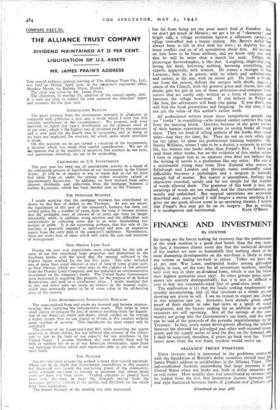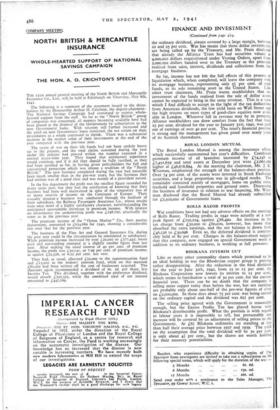FINANCE AND INVESTMENT
By CUSTOS
So strong are the forces making for recovery that the performance of the stock markets is a good deal better than the war news. In fact, it becomes clearer every day that the technical defences of the market are now so formidable that nothing short of the most dismaying developments on the war-front is likely to bring any serious or lasting set-back in prices. Today we have the 31. per cent. War Loan, undisputed leader among gilt-edged which, in turn, set the tone for all investment markets, standing well over 103 in their ex-dividend form, which is not far below their highest quotation since 1937. In other groups price move- ments are scarcely distinguishable, but it is just as difficult as ever to buy any reasonable-sized line of good-class stock.
The explanation is (i) that the funds seeking employment are steadily accumulating, and (2) that investors as a whole are not showing any desire to sell. I see no reason to expect any change in this situation just yet. Investors have already given ample proof of their ability to take bad news in a spirit of stoical resignation, and the factors making for an addition to available resources are still operating. Not all the savings of the com- munity are going into the Government's tap loans, and the same can be said of the proceeds of the periodic requisitionings by the Treasury. In fact, every major development affecting the relation between the demand for gilt-edged and other well-secured invest ments and the supply seems to load the dice on the demand side. I shall be surprised, therefore, if prices go back very far. Given better news from the war front, markets would move up.
ALLIANCE TRUST POSITION
Every investor who is interested in the problems connected with the liquidation of Britain's dollar securities should read Mr. James Prain's address to stockholders in the Alliance Trust. This old-established Scottish undertaking had large interests in the United States when war broke out, both in dollar securities and in real estate. How steadily they had contributed to revenue maY be judged from the fact that investment income between 1932 and 1939 fluctuated between limits of £596,000 and L706,000 and (Continued on page 486)
FINANCE AND INVESTMENT
(Continued from Fa.ge 4341
the ordinary dividend, always covered by a large margin, between 22 and 25 per cent. War has meant that these dollar investments are being called up by the Treasury, and Mr. Praha disclosed that already the Alliance Trust has had securities valued at 4,000,000 dollars requisitioned under Vesting Orders, apart front 5,000,000 dollars handed over to the Treasury as the proceeds realised from sales, interest, dividends and collections from the mortgage business.
So far, income has not felt the full effects of this process of liquidation which, when completed, will leave the company with its mortgage business, representing only 54 per cent. of total funds, as its sole remaining asset in the United States. Like other trust chairmen, Mr. Frain warns stockholders that re- investment of the funds realised from the sale of dollar assets cannot be expected to bring in the same revenue. This is a view which I find difficult to accept in the light of the tax deductions from American dividends, the low yield basis on Wall Street and the high returns on most types of good-class equities now avail- able in London. Whatever fall in revenue may be in prospect, Alliance stockholders can draw comfort from the fact that their 25 per cent. dividend for the year to January 31st, 1941, was paid out of earnings of over 4o per cent. The trust's financial position is strong and the management has given proof over many years of its Scottish shrewdness.
ROYAL LONDON MUTUAL
The Royal London Mutual is among the insurance offices which successfully surmounted last year's difficulties. Combined premium income of all branches increased by £74,248 to £7,451,659 and total assets at December 31st were £2,661,069 higher at £48,678,894. At the meeting the chairman, Mr. J. K. Wiseman, emphasised the strength of the balance-sheet position. Over 74 per cent. of the assets were invested in Stock Exchange securities, and a large proportion was in gilt-edged stocks. The remainder consisted mainly of mortgages, loans on public rates, freehold and leasehold properties and ground rents. Discussing the business of insurance in relation to war financing, Mr. Wise- man disclosed that the Royal Mutual had already subscribed for £2,500,000 of Government loans.
ROLLS RAZOR PROFITS War conditions have not had any adverse effects on the earnings of Rolls Razor. Trading profits in 1940 were actually at a new peak figure of £102,104, against £88,490. An increase in the tax charge from £32,000 to £60,000, however, has more than absorbed the extra earnings, and the net balance is down from £46,236 to £30,698. Even so, the deferred dividend is comfort- ably held at 8o per cent. Changes in the balance-sheet suggest that this company, now engaged on special Government work in addition to its ordinary business, is working at full pressure.
RHOKANA INTERIM CUT Like so many other commodity shares which promised to be an ideal holding in war the Rhodesian copper group is proving rather disappointing. After the reduction in the final dividend for the year to June 30th, 1940, from 25 to 15 per cent. the Rhokana Corporation now lowers its interim to 15 per cent., which seems to foreshadow a total of 3o per cent. for the current financial year. There can be no doubt that the company is selling more copper today than before the war, but net earnings are probably only about one-half of the pre-war figures of close on £2,000,000. In those days about 75 per cent. was being earned on the ordinary capital and the dividend was 624 per cent.
The selling price agreed with the Government is reasonable enough, but the Excess Profits Tax has played havoc with Rhokana's distributable profit. What the position is with regard to labour costs it is impossible to tell, but presumably any increase will be covered by an adjustment. of selling prices to the Government. At £64 Rhokana ordinaries are standing at less than half their average price between 1937 and 1939. The yield on the assumption that the total dividend will be 3o per cent. is only about 4.1- per cent., but the shares are worth holding for their recovery potentialities.































 Previous page
Previous page